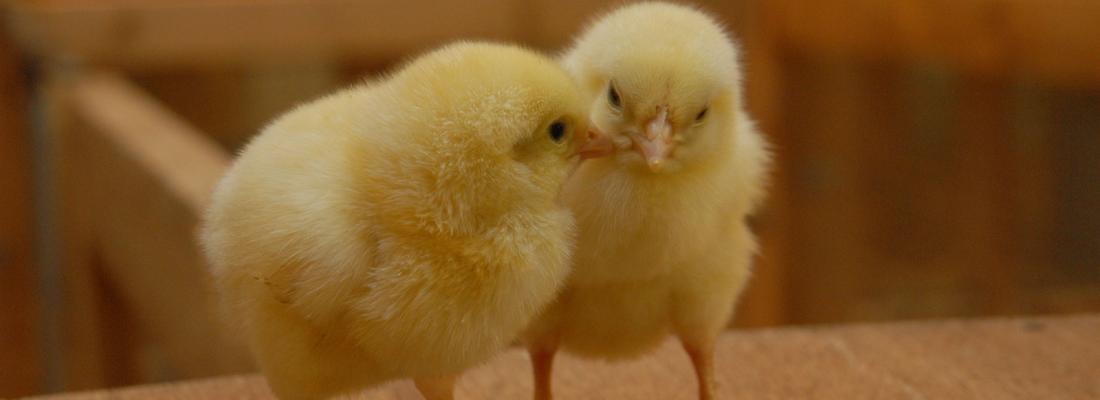Agroecology Reading time 3 min
Spontaneous intake of essential oils: long-lasting benefits for chicks
Published on 30 November 2020

In poultry production systems, chicks after hatching may be exposed to different stress factors such as being moved without food and drink to rearing houses or changes in temperature. These stressful early-life experiences have long-term effects, notably in terms of slowing their growth and affecting their welfare and health, which often requires the use of antibiotics. The determination of rearing practices that will preserve animal health and welfare is crucial to limiting the use of medicinal products. Essential oils are produced by plants to defend themselves from pathogens. They are known to have numerous medicinal properties, such as antimicrobial or anti-inflammatory activities or an ability to regulate the immune system. During this study, the scientists analysed the long-term effects of stressful postnatal conditions affecting chicks and the impact of ingesting essential oils.
Freely available essential oils
The study involved two groups of 192 chicks: the first group did not experience any stressful conditions in the hatchery while the second was subjected for 24 hours to negative experiences such as being deprived of food and water, temperature changes or movements simulating transport to a rearing house. Each group was divided into two subgroups: one subgroup had free access to four bottles that only contained water, and the second subgroup had access to four bottles: one contained water only while in the three others each containing water mixed with one of the essential oils of either verbena or cardamom or marjoram. All groups were studied for twelve days. The chicks with free access to the essential oils could therefore choose to consume them, or not. The first observation, which confirmed the previous study, was that chicks that had experienced stressful postnatal conditions chose spontaneously to drink water mixed with an essential oil (Guilloteau et al., 2019). Chicks that did not experience stress after hatching also consumed the water containing an essential oil but the quantities differed from those seen in the group that had been stressed.
The long-term effects of postnatal stress on gene expression and the beneficial effects of essential oils
The regulation of gene expression is a mechanism that is fundamental to the functioning of an organism and affects numerous functions such as bone and muscle development, the immune response and metabolism. Through a global analysis of gene expression in the blood of chicks 34 days after hatching, the scientists observed that those which had been subjected to post-hatching stress displayed long-term changes to the expression of certain genes; these changes were sex dependent. Males were affected more markedly, with changes to the expression of genes involved in the cellular response to oxidative stress (essential to the internal equilibrium of cells), energy metabolism and bone metabolism, which influences their growth. Females were less affected by post-hatching stress than males, but they nevertheless displayed modifications to the expression of genes involved in growth and reproduction.
Among the groups with access to bottles containing an essential oil, consumption from these bottles enabled the long-term attenuation or even suppression of some of these gene expression changes induced by post-hatching stress, and regulated the expression of other genes involved in the same functions. In the group that did not experience stressful conditions, the scientists observed that the consumption of essential oils also induced long-term changes to gene expression, most of them differing from those induced by the stressful conditions. This finding requires further study to understand the effects of these modifications.
This work has therefore demonstrated that chicks are able to spontaneously consume a product that benefits their health and welfare if it is made available to them. Essential oils may contribute to attenuating the effects of post-hatching stress and could thus participate in reducing the use of antibiotics in poultry units. These findings thus open new perspectives for more sustainable livestock management practices which offer animals an opportunity to care for themselves.
|
Références Foury A, Collin A, Helbling JC, Leterrier C, Moisan MP, Guilloteau LA. Spontaneous intake of essential oils after a negative postnatal experience has long-term effects on blood transcriptome in chickens. Scientific Reports 2020, 10:1-14. https://doi.org/10.1038/s41598-020-77732-5 Guilloteau LA, Collin A, Koch A, Leterrier C. Spontaneous intake and long-term effects of essential oils after a negative postnatal experience in chicks. Front. Vet. Sci. 2019, 6:72. doi: 10.3389/fvets.2019.00072 |
